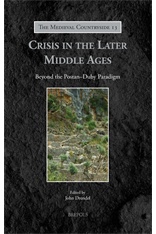RHN 101/2015 | Publication
John Drendel (ed.), Crisis in the Later Middle Ages: Beyond the Postan–Duby Paradigm (The Medieval Countryside 13), Brepols: Turnhout 2015.
A critical appraisal of the influence exerted by Malthusian explanations of crisis in the early fourteenth century in the work of Michael Postan and Georges Duby.
These papers are taken from the first of a series of five international conferences devoted to the European conjuncture in 1300. They examine the enduring influence of Michael Postan’s Malthusian model of economic crisis, and in particular the impact upon non-English speaking historians of Postan’s ideas as interpreted by Georges Duby. Through both historiographical essays and original research, the authors reinterpret the later medieval crisis on the continent and in Britain. The vision they express is of a medieval society in which economic, political, and social threads wove together town and country in a complex web extending to the furthest reaches of the ‘margin’, in the highlands of the Mediterranean and on the heaths of England. In order to understand the later medieval crisis, our attention must shift to how individuals negotiated and manoeuvred among institutions of exchange, power, and culture in their bewildering complexity rather than focus upon the modelling of reified factors.
Source: brepols.net
